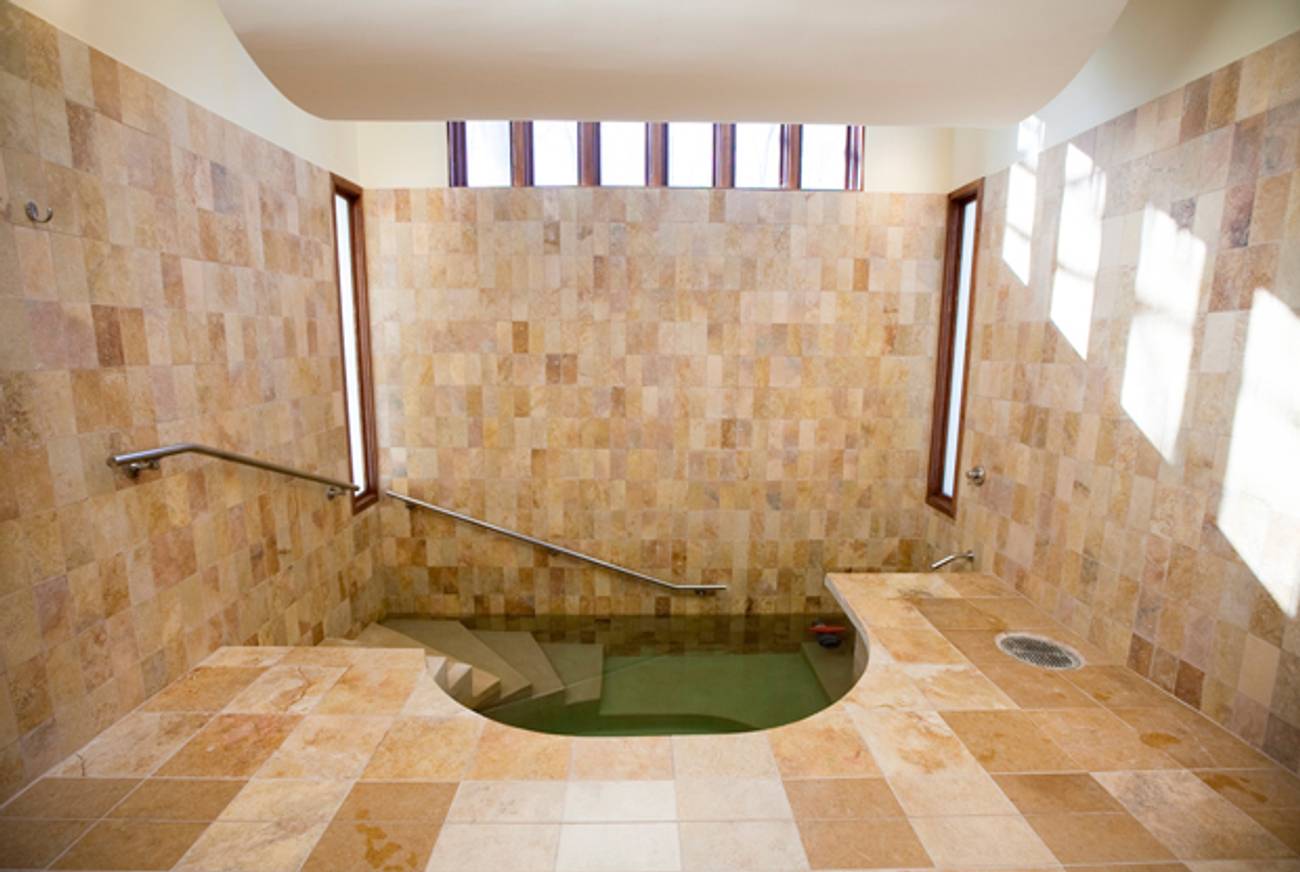A New Kind of Mikveh In New York City
Revitalizing the mikveh experience for a new generation of Jews




It’s a humid September night, just days before Yom Kippur, and while the streets of New York City hum with their routine chaos, a dozen women duck into a quiet and inconspicuous brownstone.
Huddled in the lobby of a mikveh, a Jewish ritual bath, the group is greeted by two guides from Immerse NYC, a new program in New York City dedicated to enhancing the Jewish mikveh experience by promoting it as a tool for religious purposes other than marriage purity and conversions.
The women are assigned private rooms. Minutes later, they get to work; stripping, soaking, scrubbing and meditating before immersing in the mikveh waters to pray for new beginnings ahead of the new year.
The group, ranging from ages 24 to 54, is as diverse a crowd as Immerse NYC aims to target: women who, without this new program, would not necessarily be visiting a mikveh at all.
“There are many connotations around the mikveh: some people don’t know about it, and some view it in a negative way, while others have beautiful experiences,” said Rabbi Sara Luria, who launched the program in October 2012. “We are trying to say the mikveh is a pool, and we imbue it with meaning. There are enough barriers associated with the mikveh, and we want to lower those barriers and teach people they can mark a life experience in a Jewish way.”
Immerse NYC is modeled after Mayyim Hayyim, the popular community mikveh program in Boston profiled in Tablet last year; it uses and adapts some of Mayyim Hayyim’s immersion curriculum, and is the first program of its kind in New York. Luria, ordained by Hebrew Union College in New York City, interned at Mayyim Hayyim a few years ago and recognized New York’s need for a pluralistic community mikveh program open to the public. Immerse NYC is hoping to build their own space one day—they currently borrow space from various local mikvehs for immersions.
The mikveh is traditionally used as a purification tool for women after their menstrual cycle, and for both men and women when converting to Judaism. Immerse NYC offers mikveh rituals to mark many life experiences, from childbirth to cancer, divorce, miscarriages, abortions, infertility, mourning, fatal diseases, and coming out of the closet.
They provide one-on-one sessions in preparation for the immersions, and so far Luria has trained 28 volunteer guides to accompany participants to the mikveh. The ceremonies involve seven specific “intention” steps, where a participant will focus on the spiritual motives behind the physical preparations of the mikveh, like showering and taking off nail polish. Once in the water, they have the option to have an attendant stay in the room and guide them through the ritual.
“We’ve created specific rituals for people, but most things are optional because the ceremony is up to the person immersing,” Luria added. “We really want it to feel like it’s theirs, like it should address their needs at the moment.” They also offer salon discussions about personal experiences at the mikveh, creating a rare dialogue about the Jewish tradition, Luria noted. Most women, she says, are not used to talking about their mikveh experiences.
“We provide a safe place to open the conversation and share experiences, knowledge, and challenge,” she said. “The education aspect of the program is especially important for women who would never otherwise be at the mikveh—we show them that it could really speak to them.”
Luria hopes the program will help break the negative stigma some associate with the mikveh. One Immerse NYC participant, a Reform Jewish woman who was abused as a child, said she would have never visited the mikveh otherwise, but that the program helped her use the mikveh as a healing experience.
Faith Brigham Leener, a 25-year-old North Carolina native living in New York City, is one of Immerse NYC’s volunteer mikveh attendants. She learned about mikveh laws in college from a Chabad rebbetzin at Brandeis University, and wanted others to be exposed to the same positive and meaningful perspective on the ritual. She sees the program as reviving an ancient Jewish tradition for a new generation. While the mikveh has always been part of Orthodox life, she noted, people could be educated that mikveh also brings with it deep rejuvenation.
“My hope is that people will re-imagine the mikveh, see it as a transformative experience to use in life, like prayer or Torah study,” Brigham Leener said. “For some people, you need something physical to feel spiritual, and if the body helps them make sense of the world, mikveh can be a tool to do it.”
Chavie Lieber has written for The New York Times, New York Magazine, The Daily Beast, the Huffington Post, Business Insider, the Times of Israel, and more. Follow her on twitter @chavielieber.